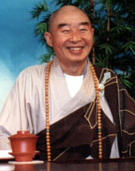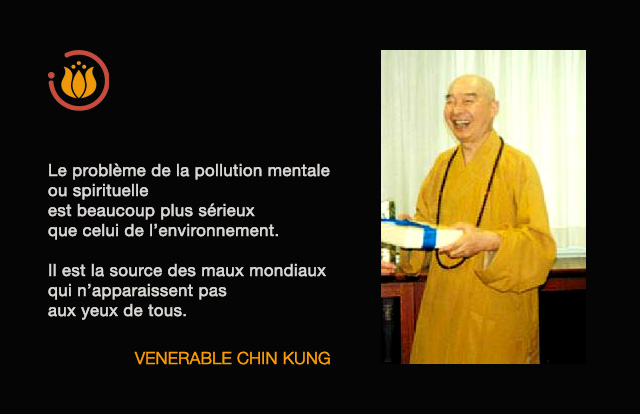 BUDDHISM AS AN EDUCATION
BUDDHISM AS AN EDUCATION
With Ven. Master Chin Kung (Taiwan)
THE CAUSE OF OUR CHAOTIC WORLD
Today’s societies in Taiwan and elsewhere in the world are rather abnormal, a phenomenon that has not been witnessed before either in the West or the East. Some Westerners have predicted that the end of the world will occur in 1999 and that Christ will return to earth for Judgement Day. Easterners have also predicted impending disasters that are similar to those predictions in the West, the only difference being the time frame, which is some twenty years later. Some of these are ancient prophecies, which we should not place too much importance on. However, if we view our environment objectively, we will realize that this world is really in danger.
Environmental pollution has become a serious problem and now humankind has finally begun to understand the need for protecting our environment. However, the problem of mental or spiritual pollution is many times more serious than that of the environment. This is the source of worldly ills that not many people realize. The Chinese have a saying, “Education is most essential to establish a nation, train its leaders and its people.” For centuries, the Chinese have always believed in the primacy of education, which is considered the foundation for a peaceful and prosperous society. It provides the solution to a myriad of social ills and leads the way to changing one’s suffering into happiness. Education has a strong impact on the nation and its people. Moreover, elementary school is the foundation, the basic building block in an educational system.

BUDDHISM AS AN EDUCATION
Buddhism officially came to China in 67 AD. The Emperor had sent special envoys to India to invite Buddhist monks to come to China to teach Buddhism, which in that period, was regarded as an educational system, and not as a religion. Regretfully, about two hundred years ago, the practice of Buddhism had taken on a more religious facade. Therefore, the purpose of this talk is to correct this misunderstanding, by leading us back to the original form of Buddhism as taught by Buddha Shakyamuni.
The goal of Buddha’s teaching
Buddhism is Buddha Shakyamuni’s educational system, which is similar to that of Confucius for both presented similar viewpoints and methods. The goal of Buddhist education is to attain wisdom. In Sanskrit, the language of ancient India, the Buddhist wisdom was called “Anuttara-samyak-sambhodi” meaning the perfect ultimate wisdom. The Buddha taught us that the main objective of our practice or cultivation was to achieve this ultimate wisdom. He further taught us that everyone has the potential to realize this state of ultimate wisdom, as it is an intrinsic part of our nature, not something one obtains externally. However, most of us have become confused through general misconceptions and therefore, are not able to realize this potential.
Therefore, if we break through this confusion, we will realize this intrinsic part of our nature. Thus, Buddhism is an educational system aimed at regaining our own intrinsic nature. It also teaches absolute equality which stemmed from Buddha’s recognition that all sentient beings possess this innate wisdom and nature. Therefore, there is no inherent difference among beings. Everyone is different now because we have lost our true nature and have become confused. The degree of wisdom exhibited by individuals depends on the degree of delusion and has nothing to do with the true nature of the individual. The Buddha’s teaching helps us to realize that innate, perfect, ultimate wisdom. With wisdom, we can then solve all our problems and turn suffering into happiness. Due to our lack of wisdom, we perceive, view and behave foolishly, and thus suffer the consequences evoked by our incorrect actions. If we have wisdom, our thoughts, viewpoints and behavior will be correct; how then can we suffer when there are no ill consequences to suffer from? Of course, we will be happy. From here, we can see that suffering is caused by delusion and the source of happiness is our own realization of wisdom.
Dharma Talks
By Vén. Chin Kung
Source: www.buddhanet.net




